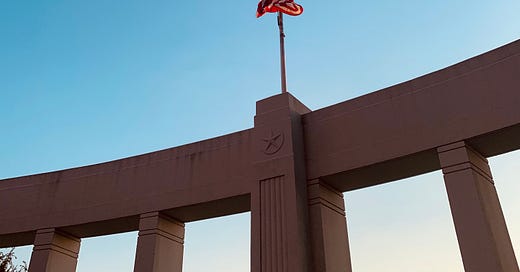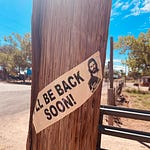Editor’s Note: originally published on Lydwine in the fall, an earlier, truncated version of this post was accidentally deleted whilst troubleshooting some technical issues on the site.
“Tea for Texas” is from the album Mighty Deeds, recorded Nov. 2021/Jan. 2022 at the Double Stop Fiddle Shop in Guthrie, Oklahoma.
ONE. A travelling salesman, alone in the Houston airport, waiting for his flight. Middle-aged, with gelled hair, rounded shoulders, and a belly too big for his shirt. He calls his boss. He calls his daughter. He calls a dozen other people on the phone — colleagues, customers, family — and as he rolls from call to call his voice and manner change, fully and fluidly, relentless as the tide.
And then:
“That cocksucker, motherfucker… he offended her… She says, ‘Where are you even located? When are you coming to my office?’ He says, ‘I’m not.’ She says, ‘Then why should I give you any business?’ Some punk-ass bitch in the office telling them… that pisses me off, I don’t disparage other reps… no, I don’t, but I don’t want someone disparaging my reputation… I need those managers to know, these motherfuckers can’t be out there saying they can take better care of a customer… that’s a slap in the face… if he could take care of them, he wouldn’t be a motherfucking inside sales rep!”
He hangs up the phone and stares into the middle distance, blankly.
TWO. John Steinbeck, from Travels with Charley in Search of America, 1962:
“I have said that Texas is a state of mind, but I think it is more than that. It is a mystique closely approximating a religion. And this is true to the extent that people either passionately love Texas or passionately hate it and, as in other religions, few people dare to inspect it for fear of losing their bearings in mystery and paradox.”
THREE. At a bar in Austin, a visiting Englishman, young, excitable, with a posh accent, somewhat drunk. He’s in Texas for a prizefight, part of the entourage of a friend who’s boxing that week in San Antonio. He loves America. He wants to live in America. He wants the bartender, Sarah, to marry him, and can’t understand why she isn’t interested. He turns instead to the man sitting next to him, enthusiastic:
“Out on the town, come on! Me and you, man, snortin’ lines of cocaine!”
He talks about his family, about his father standing over his bed every morning to wake him, the man afraid his son won’t go to work. He talks about his auntie sticking a stiletto heel in someone’s eye. He talks about a cousin in Corpus Christi. The cousin is on his third DUI.
He hates the English. Whether someone offers Churchill or Shakespeare, or even Mick Jagger, his answer is the same: “Fuckin’ scumbag.” He hates the English because his family is Irish, but he has a posh accent and can’t understand what happened. He got lucky somehow.
“Some parts of London,” he says, “seem like New Delhi to me. But I figure it’s fair play. Turnaround for the Empire.”
Later that night, another man comes into the bar and threatens the Englishman’s life. They seem to know one another. They seem to have been friends, at one point.
Soon afterward, the Englishman leaves. He takes a taxi all the way to Corpus Christi, two hundred miles away.
FOUR. Jack Kerouac, from On the Road, 1957:
“We drove on. Across the immense plain of night lay the first Texas town, Dalhart, which I’d crossed in 1947. It lay glimmering on the dark floor of the earth, fifty miles away. The land by moonlight was all mesquite and wastes. On the horizon was the moon. She fattened, she grew huge and rusty, she mellowed and rolled, till the morning start contended and dews began to blow in our windows—and still we rolled. After Dalhart—empty crackerbox town—we bowled for Amarillo, and reached it in the morning among windy panhandle grasses that only a few years ago waved around a collection of buffalo tents. Now there were gas stations and new 1950 jukeboxes with immense ornate snouts and ten-cent slots and awful songs. All the way from Amarillo to Childress, Dean and I pounded plot after plot of books we’d read into Stan, who asked for it because he wanted to know. At Childress in the hot sun we turned directly south on a lesser road and highballed across abysmal wastes to Paducah, Guthrie, and Abilene, Texas. Now Dean had to sleep, and Stan and I sat in the front seat and drove. The old car burned and bopped and struggled on. Great clouds of gritty wind blew at us from shimmering spaces. Stan rolled right along with stories about Monte Carlo and Cagnes-sur-Mer and the blue places near Menton where dark-faced people wandered among white walls.
Texas is undeniable… We were already almost out of America and yet definitely in it and in the middle of where it’s maddest.”
FIVE. Back in Dallas, but this time with a teenaged daughter in tow. She’s on the cusp of adulthood, but never before been in a big city, never walked the asphalt canyonlands of an urban core, kaleidoscope of movement and shadow in spring sunshine. A car runs a red light and almost kills a pedestrian. Addicts stare at the pavement, stare at the walls. Farther down the street, a woman shows us a pair of flat-faced, goggle-eyed Persian cats riding inside a screened-in baby carriage.
We duck inside Saint Jude Chapel, and sit for several minutes before the Risen Christ detailed in sapphire tilework behind the altar. The man almost killed by the car slips into the chapel behind us and kneels in prayer. My daughter gestures toward the mosaic and whispers, “He doesn’t have his wounds.” This disappoints her — she knows the blood red tiles would offer wonderful contrast in all the blue.
Outside, we continue walking west along Main Street, and I pick up the story where I left off:
“So, that morning they flew over from Fort Worth and landed at Love Field. The motorcade brought them down here, down Main Street. People were lined up on either side, people were watching and waving from the windows. He didn’t want the bubble top on the Lincoln — he wanted people to be able to see him. He was a good politician. It’s why he brought his wife with him. She was there beside him in the car, wearing her pretty pink suit and her pillbox hat. He told her to take off her sunglasses, so people could see her face.”
We stop for a moment at the intersection of Main and Houston, opposite the old Dallas County Courthouse.
“The car turned here, moving slow, and then again onto Elm Street. Oswald was waiting — you can see where they’ve got the window marked — up on the sixth floor of the Texas School Book Depository. He had a warehouse job there. He said he was a Marxist, he even emigrated to the Soviet Union at one point, but —”
She interjects: “But he just wanted to be something.”
“Right. What he was, he — he was a jerk. Just a jerk. He’d already tried to assassinate another man, a general, earlier that year. He failed. He was always a failure. Now he found out the President of the United States was going to pass right by him. So that morning he brought his rifle along with him to work. He got it through the mail.”
We cross the street and walk toward the plinth from atop which Zapruder shot his famous film.
“It happened very quickly. If you watch the film, the car goes behind a freeway sign, and when it comes back into view Kennedy is clutching at his throat. A second or two later — his head just explodes, a burst of red, it’s grotesque. He topples sideways in the seat, toward his wife, and she starts crawling out onto the back of the car. One of the Secret Service agents comes running, leaps up onto the back and grabs her, pushes her down into the seat… and away they went, to Parkland Hospital.”
I look into her eyes, trying to see if she understands. I want her to know why we’re here.
“That Secret Service agent,” I say, “Clint Hill was his name. At the hospital, he gave Mrs. Kennedy his suit coat so she could wrap the President’s head, before they pulled the body from the car. Hill just died in February. He lived his entire life with that regret — what if I’d been just a little bit faster? It tore him up. He spent almost a decade in his basement, smoking cigarettes and drinking Scotch. Grieving.”
In the grass near the street a father is trying to lead his family in the taking of photographs, gathering them in and holding up a selfie stick. Broad smiles, but when the father checks the image he sees his teenaged son was squinting from the glare of the sun and so berates him for ruining the picture. My daughter and I watch all this unfold in silence.
Finally she says, firmly, wisely: “Some people have no respect for ghosts.”
Late that evening, on our drive back to Oklahoma, the blaze of Venus in the western sky — a promise of distant worlds of love somehow more deadly than our own.
Brian Kennedy is the founder of Lydwine, as well as the frontman and principal songwriter of the arthouse country band The Cimarron Kings. He lives with his wife and six children in Guthrie, Oklahoma.










Share this post